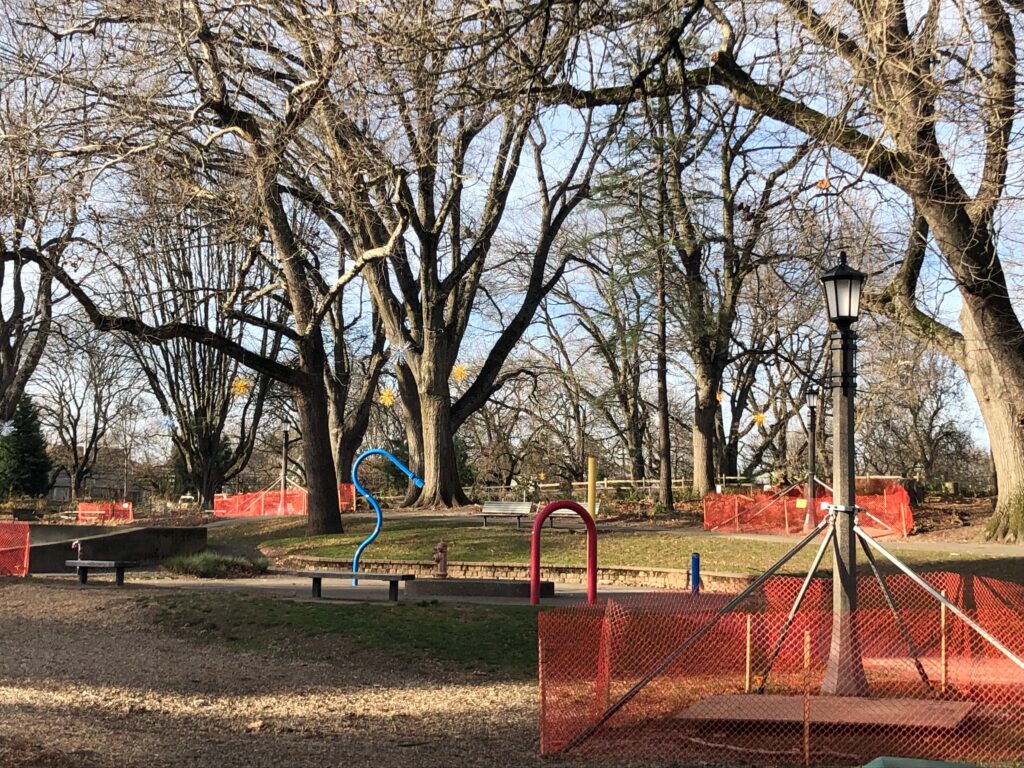The city of Portland has paid $942,600 to a babysitter and a boy who
were seriously injured
after the babysitter strapped a hammock to a city lamppost that then toppled onto them.
The June 2022 incident and the ensuing lawsuits that were filed by the babysitter and the boy’s mother prompted angry and vocal criticism from residents, who said the lampposts were never meant to support the weight of hammocks and their occupants. Attorneys for the babysitter and the boy, however, contended the city failed to warn the public of the dangers presented by hundreds of the city’s historic lampposts. They pointed to a city assessment months after the incident that found that the posts
“could pose life and safety hazards to the public.”
The babysitter affixed the hammock to a tree on one end and a concrete lamppost on the other end in Irving Park in Northeast Portland.
Both the babysitter and the boy, who was 9 years old at the time, were in the hammock when the lamppost came crashing onto them, according to the lawsuits. The babysitter suffered extensive injuries throughout her body, including a crushed pelvis and a concussion that caused her to black out. The boy suffered fractures to his skull, jaw and leg; was pinned under the lamppost for more than 10 minutes and later underwent open heart surgery, according to his mother’s lawsuit.
Court papers show he endured a long and grueling recovery, with his grandmother flying in from overseas to care for him and both of his parents cumulatively taking months off from their jobs. His medical expenses reached at least $186,000 over the course of more than two years, according to court papers.
“He is a tough kid who was very motivated and has worked really hard to recover as much as possible,” said Jane Paulson, the Portland attorney representing the boy and his family, in an email to The Oregonian/OregonLive on Friday. “He will have some lifelong limitations but is doing well considering everything.”
The pair of lawsuits had been scheduled to go to trial this month in Multnomah County Circuit Court, but attorneys for the babysitter and the boy’s family reported that the cases against the city and the hammock’s maker had been settled. The suits also had faulted the manufacturer, GCW Ventures, which operates under the brand name Hidden Wild, for allegedly failing to provide adequate warning about affixing the hammock to structures such as lampposts.
The babysitter, Ayva Levin, received $160,000 from the city. Though court records don’t state her age, she was an adult at the time of the incident.
The boy’s mother, Daniela Araujo, received $782,600 on behalf of her son. That’s the most that the city was allowed to pay
under tort claim limits
established by the state. A conservatorship has been created for the boy to oversee his cash award until he reaches adulthood.
The
Portland City Council approved
the settlements in June.
It’s unclear if the hammock company paid the babysitter or the boy any money to settle their claims — or if the babysitter was required to pay any damages for her role after the hammock manufacturer filed a third-party complaint placing blame on her.
Unlike with the city settlements, the terms of the settlements with the hammock’s manufacturer haven’t been made public because it’s a private entity.
David Rocker, a Portland lawyer who represented the hammock’s maker, said a confidentiality agreement prevents him from sharing many of the details about the litigation.
“I can tell you that the hammock instructions were sewn directly onto the hammocks themselves and stated that the hammocks should only be attached to healthy trees with at least a 10-inch diameter,” Rocker said in an email to The Oregonian/OregonLive.
A spokesperson for Portland Parks & Recreation didn’t respond to a request for comment. The city has previously said that the public shouldn’t attach anything, including hammocks or pets on leashes, to its lampposts.
Portland City Attorney Robert Taylor expressed satisfaction with the outcome of the litigation.
“The City Attorney’s Office believes this mutually agreed settlement is in the interest of all parties,” Taylor wrote in an email.
According to court filings, the city tried to fight the claims by pointing to
a recreational immunity statute
that is meant to protect landowners when people who recreate on their properties are injured. But the city faced an uphill battle defending itself, with both lawsuits arguing that the babysitter brought the child to the park as part of her job and as a means to earn a living, not as a form of recreation.
Nine months after the lamppost struck the babysitter and boy,
the city of Portland announced
it was replacing hundreds of posts in parks across the city. A safety assessment found the posts could pose a hazard to park users. That led the city to ultimately remove
290 lampposts from 13 parks
and shrink their evening hours until the lighting fixtures could be replaced. Some residents directed their frustrations at the babysitter, faulting her for the lamppost collapsing.
The high profile collapse of the lamppost is among one of a series across the United States and the world, in which people who affixed hammocks to trees, poles, structures or posts were wounded or died.
In August 2022, two months after the Irving Park lamppost collapsed, a 19-year-old student at Lewis & Clark College in Southwest Portland
died
when he was smashed by a brick column. He was in a hammock that was attached to the column. The student’s mother
filed a $30 million lawsuit
against the college and the hammock’s maker. The suit was later settled but the terms were not publicly disclosed.
— Reporter Aimee Green can be reached at 503-294-5119,
agreen@oregonian.com
or on
Bluesky
.





More Stories
Portland pays nearly $1M to injured boy and babysitter, who strapped hammock to lamppost before it collapsed
Portland pays nearly $1M to injured boy and babysitter, who strapped hammock to lamppost before it collapsed
Portland pays nearly $1M to injured boy and babysitter, who strapped hammock to lamppost before it collapsed